
Let It Be is the twelfth and final studio album by the English rock band the Beatles. It was released on 8 May 1970, almost a month after the group's public break-up, in tandem with the documentary of the same name. Concerned about recent friction within the band, Paul McCartney had conceived the project as an attempt to reinvigorate the group by returning to simpler rock 'n' roll configurations. Its rehearsals started at Twickenham Film Studios on 2 January 1969 as part of a planned television documentary showing the Beatles' return to live performance.

"Get Back" is a song recorded by the English rock band the Beatles and Billy Preston, written by Paul McCartney, and credited to the Lennon–McCartney partnership. It was originally released as a single on 11 April 1969 and credited to "The Beatles with Billy Preston". The song is one of the few examples of John Lennon featuring prominently as lead guitarist. The album version of this song contains a different mix that features a studio chat between Paul McCartney and John Lennon at the beginning, which lasts for 20 seconds before the song begins, also omitting the coda featured in the single version, and with a final dialogue taken from the Beatles' rooftop concert. This version became the closing track of Let It Be (1970), which was released just after the group split up. The single version was later issued on the compilation albums 1967–1970, 20 Greatest Hits, Past Masters, and 1.
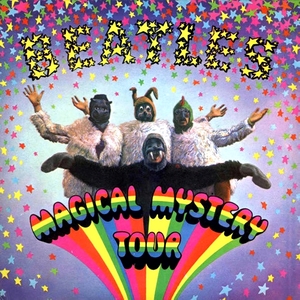
Magical Mystery Tour is a record by the English rock band the Beatles that was released as a double EP in the United Kingdom and an LP in the United States. It includes the soundtrack to the 1967 television film of the same name. The EP was issued in the UK on 8 December 1967 on the Parlophone label, while the Capitol Records LP release in the US and Canada occurred on 27 November and features an additional five songs that were originally released as singles that year. In 1976, Parlophone released the eleven-track LP in the UK.
The Beatles Anthology is a multimedia retrospective project consisting of a television documentary, a three-volume set of double albums, and a book describing the history of the Beatles. Beatles members Paul McCartney, George Harrison and Ringo Starr participated in the making of the works, which are sometimes referred to collectively as the Anthology project, while John Lennon appears in archival interviews.
Apple Records is a British record label founded by the Beatles in 1968 as a division of Apple Corps Ltd. It was initially intended as a creative outlet for the Beatles, both as a group and individually, plus a selection of other artists including Mary Hopkin, James Taylor, Badfinger and Billy Preston. In practice, the roster had become dominated by the mid-1970s with releases of the former Beatles as solo artists. Allen Klein managed the label from 1969 to 1973, then it was managed by Neil Aspinall on behalf of the Beatles and their heirs. Aspinall retired in 2007 and was replaced by Jeff Jones.
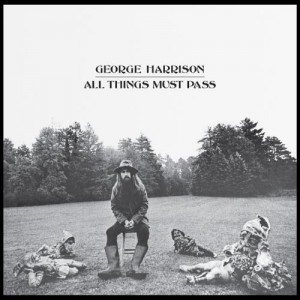
All Things Must Pass is the third studio album by the English rock musician George Harrison. Released as a triple album in November 1970, it was Harrison's first solo work after the break-up of the Beatles in April that year. It includes the hit singles "My Sweet Lord" and "What Is Life", as well as songs such as "Isn't It a Pity" and the title track that had been overlooked for inclusion on releases by the Beatles. The album reflects the influence of Harrison's musical activities with artists such as Bob Dylan, the Band, Delaney & Bonnie and Friends and Billy Preston during 1968–70, and his growth as an artist beyond his supporting role to former bandmates John Lennon and Paul McCartney. All Things Must Pass introduced Harrison's signature slide guitar sound and the spiritual themes present throughout his subsequent solo work. The original vinyl release consisted of two LPs of songs and a third disc of informal jams titled Apple Jam. Several commentators interpret Barry Feinstein's album cover photo, showing Harrison surrounded by four garden gnomes, as a statement on his independence from the Beatles.
"Watching Rainbows" is an unreleased song by the Beatles recorded on 14 January 1969 during the Get Back sessions at Twickenham Studios. It features John Lennon on lead vocal and electric piano, Paul McCartney on electric guitar, and Ringo Starr on drums. No bass guitar was present as McCartney was filling in for the absent George Harrison, who had temporarily left the group at that stage of the sessions. The song is played in two chords and has since been compared to "I Am the Walrus" and "I've Got a Feeling" for the similarities in the song's lyrics and structure.
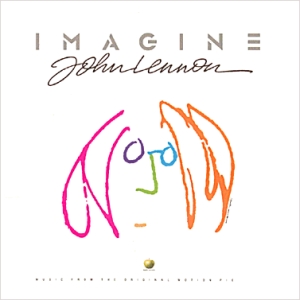
Imagine: John Lennon is a soundtrack album of popular music compiled for the 1988 documentary film Imagine: John Lennon from songs written or co-written by John Lennon. Originally released that year as a double album, it now remains available on one CD.

"Magical Mystery Tour" is a song by the English rock band the Beatles and the title track to the December 1967 television film of the same name. It was released on the band's Magical Mystery Tour soundtrack record, which was a double EP in Britain and most markets but an album in America, where Capitol Records supplemented the new songs with tracks issued on the Beatles' 1967 singles. The song was written primarily by Paul McCartney and credited to the Lennon–McCartney partnership.

"All Things Must Pass" is a song by English rock musician George Harrison, issued in November 1970 as the title track to his triple album of the same name. Billy Preston released the song originally – as "All Things (Must) Pass" – on his Apple Records album Encouraging Words (1970) after the Beatles had rehearsed the song in January 1969 but did not include it on their Let It Be album. The composition reflects the influence of the Band's sound and communal music-making on Harrison, after he had spent time with the group in Woodstock, New York, in late 1968. In his lyrics, Harrison drew inspiration from Timothy Leary's poem "All Things Pass", a psychedelic adaptation of the Tao Te Ching.
The Beatles were an English rock band, active from 1960 until 1970. From 1962 onwards, the band's members were John Lennon, Paul McCartney, George Harrison and Ringo Starr. Their break-up is attributed to numerous factors, including: the strain of the Beatlemania phenomenon, the 1967 death of manager Brian Epstein, bandmates' resentment of McCartney's perceived domineering, Lennon's heroin use and his relationship with Yoko Ono, Harrison's increasingly prolific songwriting, the floundering of Apple Corps, the Get Back project, and managerial disputes.

Let It Be is a 1970 British documentary film starring the Beatles and directed by Michael Lindsay-Hogg. The film documents the group's rehearsing and recording songs in January 1969 for what was to become their twelfth and final studio album Let It Be. The film includes an unannounced rooftop concert by the group, the last public performance of the four together.

Encouraging Words is the fifth studio album by American soul musician Billy Preston, released in September 1970 on Apple Records. It was the last of Preston's two albums for the Beatles' Apple label, after which he moved to A&M Records. The album was co-produced by George Harrison and Preston. Harrison's songs "All Things Must Pass" and "My Sweet Lord" were issued here for the first time, two months before his own recordings appeared on his triple album All Things Must Pass.

"Let Me Roll It" is a song by the British–American rock band Paul McCartney and Wings, released on their 1973 album Band on the Run. The song was also released as the B-side to "Jet" in early 1974, and has remained a staple of McCartney's live concerts since it was first released.

"Wah-Wah" is a song by English rock musician George Harrison from his 1970 triple album All Things Must Pass. Harrison wrote the song following his temporary departure from the Beatles in January 1969, during the troubled Get Back sessions that resulted in their Let It Be album and film. The lyrics reflect his frustration with the atmosphere in the group at that time – namely, Paul McCartney's over-assertiveness and criticism of his guitar playing, John Lennon's lack of engagement with the project and dismissal of Harrison as a songwriter, and Yoko Ono's constant involvement in the band's activities. Music critics and biographers recognise the song as Harrison's statement of personal and artistic freedom from the Beatles. Its creation contrasted sharply with his rewarding collaborations outside the group in the months before the Get Back project, particularly with Bob Dylan and the Band in upstate New York.

"Run of the Mill" is a song by English musician George Harrison, released on his 1970 triple album All Things Must Pass. Harrison wrote the song shortly after the Beatles' troubled Get Back sessions in early 1969, during a period when his growth as a songwriter had inadvertently contributed to the dysfunction within the Beatles' group dynamic. The lyrics reflect the toll that running their company Apple Corps had taken on relationships within the band, especially between Paul McCartney and the other three Beatles, as well as Harrison's dismay at John Lennon's emotional withdrawal from the band. Commentators recognise "Run of the Mill" as one of several Harrison compositions that provide an insight into events behind the Beatles' break-up, particularly the difficulties surrounding Apple.

"Let It Down" is a song by English musician George Harrison, released on his 1970 triple album All Things Must Pass. The recording was co-produced by Phil Spector and employs the latter's Wall of Sound production technique to lavish effect. Its brash opening and choruses contrast with the ethereal quality of the verses – a loud/soft approach that has been credited with influencing indie bands during the 1980s and 1990s.

Everyday Chemistry is a remix album that was made available as a free digital download on 9 September 2009. The album was released along with a story of anonymous authorship. It mashes up various songs from the Beatles' individual solo careers, including tracks from 27 albums. The album portrays itself as being taken from an alternate universe in which the Beatles had not broken up.
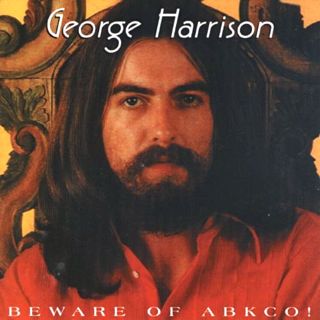
Beware of ABKCO! is a bootleg album of songs performed by English rock musician George Harrison in May 1970. It contains songs that were under consideration for Harrison's triple album All Things Must Pass, his first release as a solo artist following the break-up of the Beatles. The performances were taped in a single session at Abbey Road Studios in London, on 27 May 1970, for the benefit of Harrison's co-producer, Phil Spector. Seven of the fifteen songs were subsequently recorded formally for inclusion on All Things Must Pass, as was "Everybody, Nobody" after Harrison reworked it as "Ballad of Sir Frankie Crisp ". From its 1994 release by Strawberry Records, the bootleg provided the only available record of five songs that Harrison never revisited during his career. Among these is a 1968 collaboration with Bob Dylan titled "Nowhere to Go". All fifteen songs were officially released in August 2021, as part of the Uber and Super deluxe editions of the All Things Must Pass: 50th Anniversary box set.
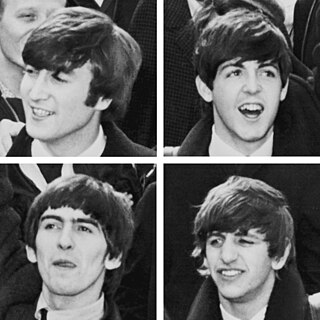
The following outline is provided as an overview of and topical guide to the Wikipedia articles available about the Beatles from their formation through their breakup; it does not include information about members' solo careers.













